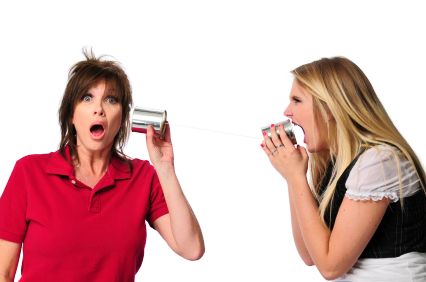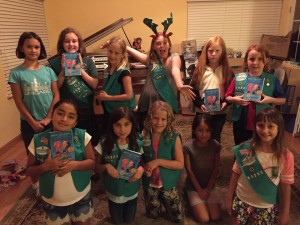|
|
January 8, 2016
 Hearing isn’t the same as listening Parents of teens have one of the roughest jobs. The dynamic between you and your son/daughter is changing so quickly it can be challenging to stay focused on your job description. It was easier when the kids were younger and you could pick them up, if you needed to, and get them out of harm’s way. With teens, it’s not always clear what your job is or how to do it.
There’s no single golden rulebook for parenting (though I’ve written a good one and so have lots of other people in the know), but these 10 tips can help you stay centered. And that’s exactly where you need to be if you want to be an effective parent and role model for your adolescent kids.
- Remember that you are the parent — Your job is to protect your child and prepare him/her to become a fully functioning adult. Being a leader and a compassionate teacher is more important than being your teen’s friend.
- Remain calm — Nothing gets resolved when stress makes it impossible to think clearly. Can’t respond rationally? Then take a break until you can.
- Talk less and listen more — Just like the rest of us, teens want to be respected and heard. Be a “safe” and available person to talk to.
- It’s a balancing act — A key challenge in parenting teens is to remain emotionally connected while granting your kids more privacy and autonomy.
- They’re always watching – Want your teen to be trustworthy, responsible, and compassionate? Make sure you’re modeling those values in your own life.
- Make your expectations clear and be consistent with your follow-through— If kids know the consequences ahead of time and they’ve bought into the rules of the house, they’re more likely to make healthy choices.
- Catch your teen in the act of doing something right — Praise shows that you noticed their efforts. It also promotes a feeling of competency.
- Be real — Father/mother does NOT always know best. Admit your own confusion and mistakes. Apologize when appropriate. Show your kids that just like them, you too are also “a work in progress.”
- Regularly create time to enjoy being a family — Having regular meals together and relaxing, unplugged from digital technology, is a gift with long-lasting benefits.
- Lighten up! — Humor is a great de-stressor. Remember, no one stays a teen (or the parent of a teen) forever!
If you’ve got other tips for parenting tweens and teens, I’d love to hear from you.

November 7, 2015
 We’ve got the tools and we’re brave enough to use ’em! Last month I began partnering with the Girl Scouts of Northern California by presenting my Girls Friendship without the Drama Workshops. In the first hour I teach girls to navigate all kinds of sticky peer conflicts while the moms (and the few cool dads who’ve shown up) sit back, listen and observe. During the second hour the girls skedaddle into another room where they engage in more (supervised) friendship-building skills while the parents and I circle the wagons and get to the heart of what girls need from those of us who love them.
To date I’ve done nine of these workshops with another seven scheduled. Girls can’t wait to start using what they’ve learned. Moms are reminded how painful it can be feel “replaced” by a friend. Dads are stunned at how hard it is for girls to tell a friend, “Stop. I don’t like that.” Parents are thrilled to have new insight, language, and context to help their daughters do a better job navigating friendships.
Here are some tips to help you help your daughters and sons resolve the inevitable issues that come up between our kids and their peers.
Dealing with Friendship Challenges
- Calm Down. No matter what awful thing some child has done to your daughter or son, calming down first makes it easier to get through the upset. So take some slow deep breaths and encourage your child to do the same.
- Show that you get it. Acknowledge that it hurts when a friend turns against you. Reflect back what you hear, “You sound really hurt, angry, and confused.” Share one of your own “hurt by a friend” stories. Share what you learned and how you used it to become a more thoughtful person and a better friend. This models empathy and reassures your child that (s)he will survive.
- What Can/Can’t You Control? Tell your child, “You can’t control a friend’s behavior or feelings, but you can get a handle on your own.” When we try to control things we can’t control, it stresses us out and makes us feel powerless. Don’t let your kid go there!
- You’ve got options! Even after a blow-up with a bff, your child is far from powerless. She always has options. For example, your child might:
- Never talk to that friend again
- Get back at her by spreading gossip
- Suppress the hurt and act like it didn’t bother you
- Find new friends
Brainstorming should be open-ended. Encourage your child to freely explore ideas without your judging them. They’re just ideas and this is a clearing process. Even the worst, knee-jerk options offer great (and totally safe) learning opportunities. In addition, you’ll give your child a gift by talking about all of this. When s/he doesn’t have to worry about your rushing in to “fix” the problem, your child’s thinking process will be accelerated. Hopefully, she’ll move closer to the time when she no longer accepts disrespectful behavior from anyone, including herself!
At the end of the process your child may decide to take a vacation from the drama or to find the EXIT out of the friendship. That’s her choice. But just because she’s finished, doesn’t mean she has the right to make life unhappy for an ex-friend. I put it is this way: You have the right to choose your friends, but it’s NEVER okay to be cruel or disrespectful. Keep your distance if you choose, but always treat others the way you want to be treated. Old rule. Still applies.

October 22, 2015
 I’m a bad ass. Just for tonight. Around here we’re experiencing a black and orange explosion. Each year the Halloween house make-overs get more impressive.
We’ve still got nine days to go, so I thought I’d get ahead of the curve and write about Halloween’s teachable moments for kids. Non-spoiler alert: This is not a parent tip sheet on how to put reasonable restrictions on kids’ sugar consumption. (That’s not a bad idea, but I leave it to the nutritionists.) Instead, let’s talk about the “mask” kids put on for Halloween vs. the mask many of our tweens and teens wear every single day. Halloween is a time to pretend to be someone else. It can be great fun and I’m a huge fan. But what happens when your child wears a mask all the time, hiding who he or she really is because of fear of disapproval from peers or even from you?
I’ve been thinking about the fine art of faking it for a long time because I work with tweens and teens and, face it, they can be masters of deception. When I talk to kids about consciously putting on a “mask,” as we do when we get up on stage to perform in a play or dress up to explore other identities, it fits right into the idea of figuring out who you are, which is the manifesto of adolescence. But when we get so attached to hiding behind the mask that we’re no longer conscious of wearing it then we are faking it without knowing it. That’s never a good place to be, especially at a time when our tweens and teens ought to be exploring what it means to be one’s authentic self.
I have asked kids: How do you know when you’re faking it? They’ve provided profound responses, like these:
I get a sinking feeling in my stomach.
I feel like what I’m doing is not really me, but I continue doing it anyway.
I feel like a fraud in my own body.
I feel like a jumble of very confused spaghetti.
We ought to encourage our kids to reflect deeply on who they are and who they are becoming. They need to think clearly, despite the cacophony of judgments and opinions happening around them and within them. The best way I know to do that is by telling them how much we appreciate who they are when they are being authentic. We need to also model authenticity in own our lives. That doesn’t mean that we are always a certain way. Our behavior and attitudes change depending on circumstance and setting, and that’s appropriate. But when it’s “just us,” in the family, we need to create opportunities to talk about what it means to be true to oneself and to have integrity. No faking it.

July 20, 2015
 I give up!!!! Part 6 of my Parenting Q&A series brings a question about kids and mistakes. While it’s natural for parents to be on the look-out for our children’s missteps, how we respond can have a huge impact on a child’s developing autonomy and her view of a problem vs. a challenge.
When my daughter tries something and things don’t turn out the way she envisioned, she gets upset and gives up. We hear a lot these days about the importance of kids developing persistence and GRIT. What can I do to help her learn from mistakes and try again?
We’re all human and we all make mistakes. At least that’s what we say. But in some families children have learned it’s not safe to make mistakes because parents tease or shame. If a child repeatedly makes the same mistake parents may get frustrated and say, “You know better than that!” But if children actually knew better they would do better. Right? The fact that a child makes a mistake should not be cause for a parent to jump down the kid’s throat. That kind of reaction will only teach children that mistakes should be avoided!
Here’s the truth about mistakes: They are amazing opportunities to learn. Think about the word mistake … it’s a moment when learning has not yet taken hold. When the learning takes, then we don’t make that mistake again.
Parents might gain insight into their attitudes about mistake by looking back to their own childhood and how their parents responded to mistakes. Maybe you got yelled at or punished. Hopefully, you did not get hit, slapped or spanked, but maybe you did. If you experienced that kind of parental response, then you learned that mistakes must be avoided at all costs. But wait a minute! What kind of lesson is that? The first time we try anything we are going to fail. It would be a lucky fluke if we got it right, first time out of the gate.
How about we turn this “Avoid mistakes” mantra on its head? What if we give kids the realistic expectation that they will fail and they’ll learn something useful from every failure? What if we give them permission to fail and try again? When parents encourage their children’s to make mistakes, we teach them about persistence, GRIT and determination. They will learn to pick themselves up and evaluate what just happened. They will learn to modify their response so that their next attempt may result in a different outcome. That’s how you raise successful children who are fearless in facing obstacles.
 — Older Posts »
| |















